BUSN20016 Research: Forensic Accounting for Fraud Detection
VerifiedAdded on 2023/06/09
|6
|979
|266
Report
AI Summary
This research report investigates the role of forensic accounting in fraud detection, addressing the increasing instances of fraud in both public and private sectors. It highlights the limitations of traditional auditing methods in the face of evolving fraudulent activities and introduces forensic accounting as a specialized field equipped to handle modern white-collar crimes. The research aims to determine the impact of forensic accounting on fraud detection and the potential for reducing fraud cases through its application. A mixed methodology, incorporating primary data from interviews and questionnaires with forensic accountants and officials, and secondary data from journals, books, and academic articles, was employed to analyze the role and impact of forensic accounting in combating fraud.
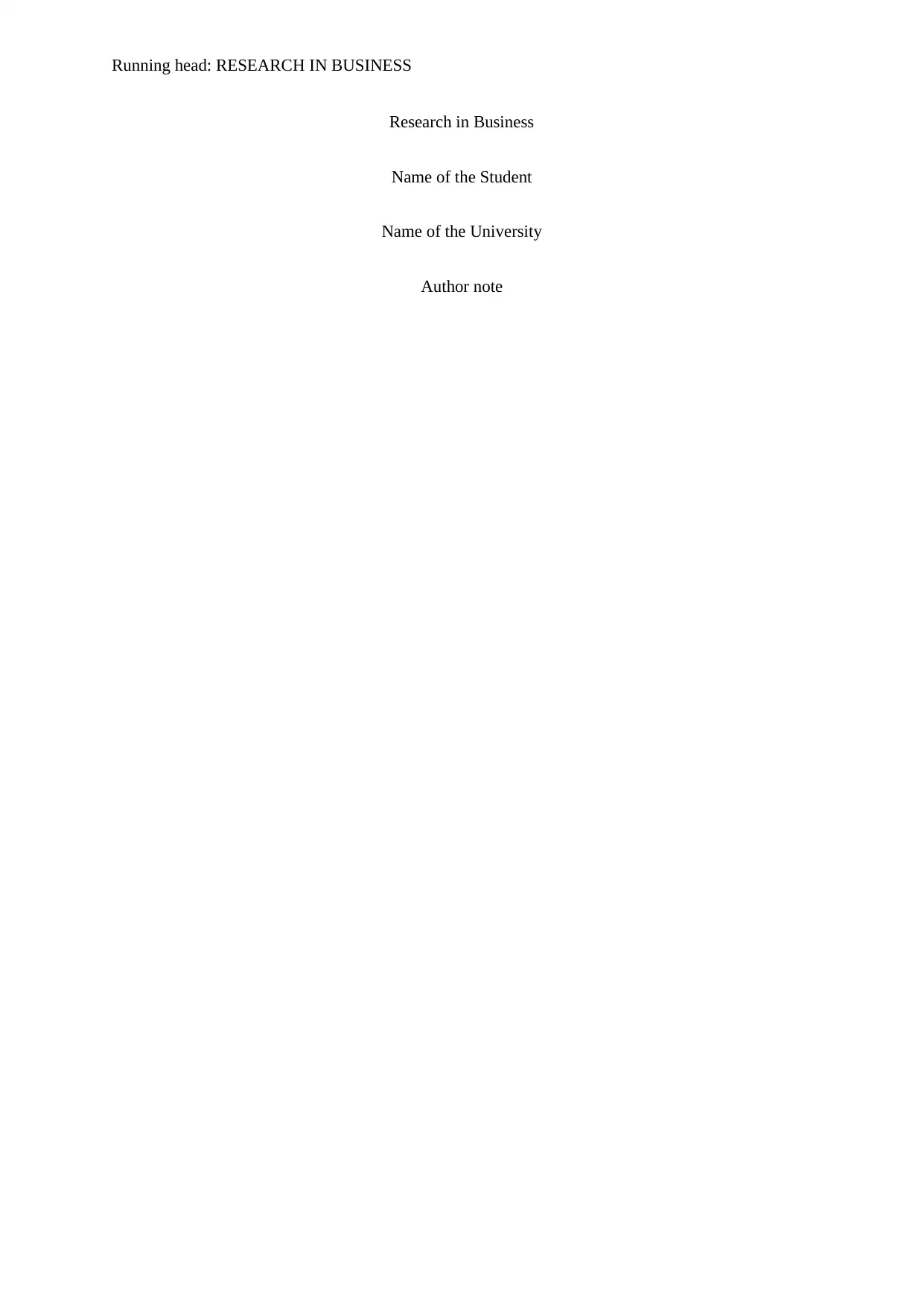
Running head: RESEARCH IN BUSINESS
Research in Business
Name of the Student
Name of the University
Author note
Research in Business
Name of the Student
Name of the University
Author note
Paraphrase This Document
Need a fresh take? Get an instant paraphrase of this document with our AI Paraphraser
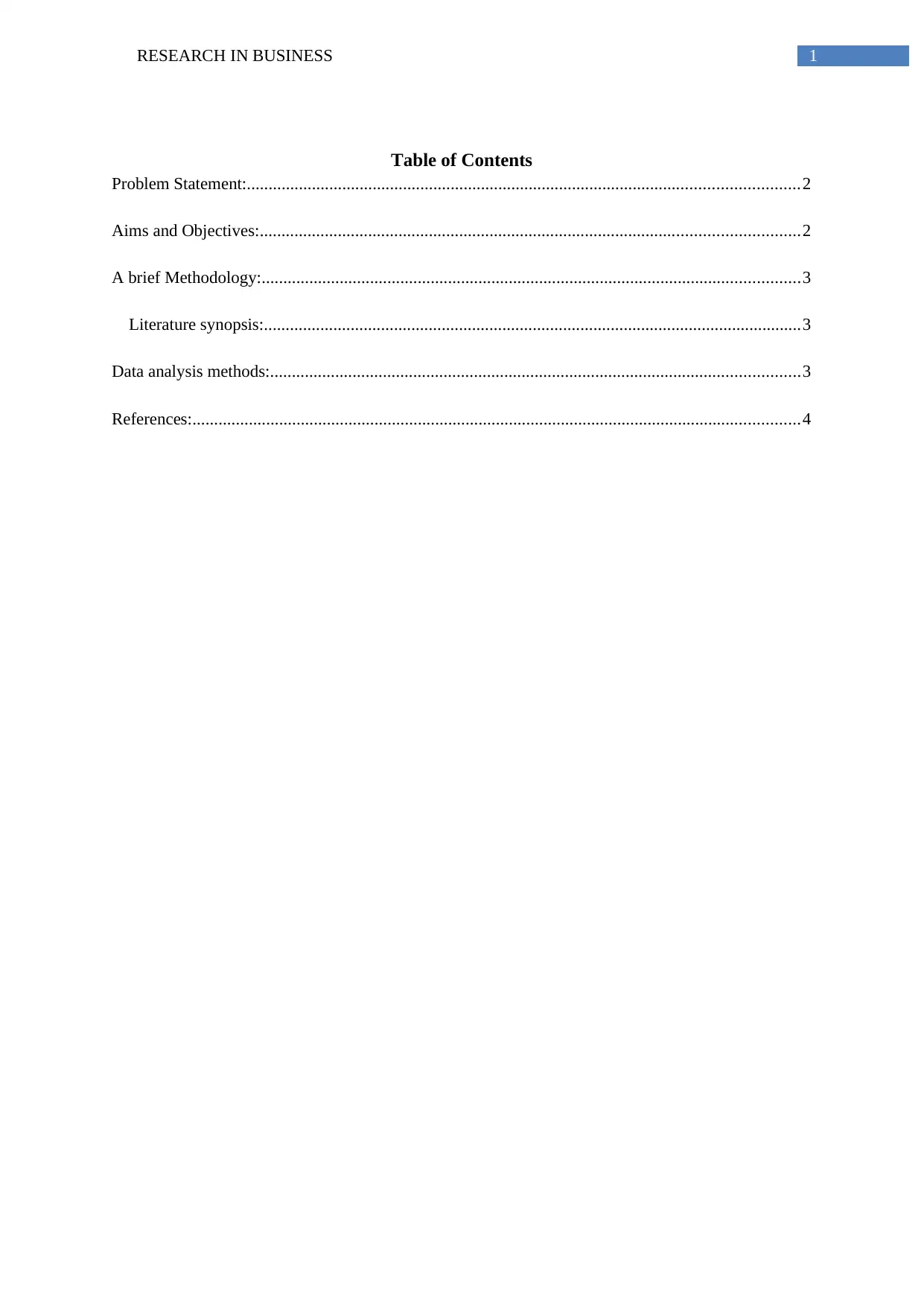
1RESEARCH IN BUSINESS
Table of Contents
Problem Statement:...............................................................................................................................2
Aims and Objectives:............................................................................................................................2
A brief Methodology:............................................................................................................................3
Literature synopsis:............................................................................................................................3
Data analysis methods:..........................................................................................................................3
References:............................................................................................................................................4
Table of Contents
Problem Statement:...............................................................................................................................2
Aims and Objectives:............................................................................................................................2
A brief Methodology:............................................................................................................................3
Literature synopsis:............................................................................................................................3
Data analysis methods:..........................................................................................................................3
References:............................................................................................................................................4
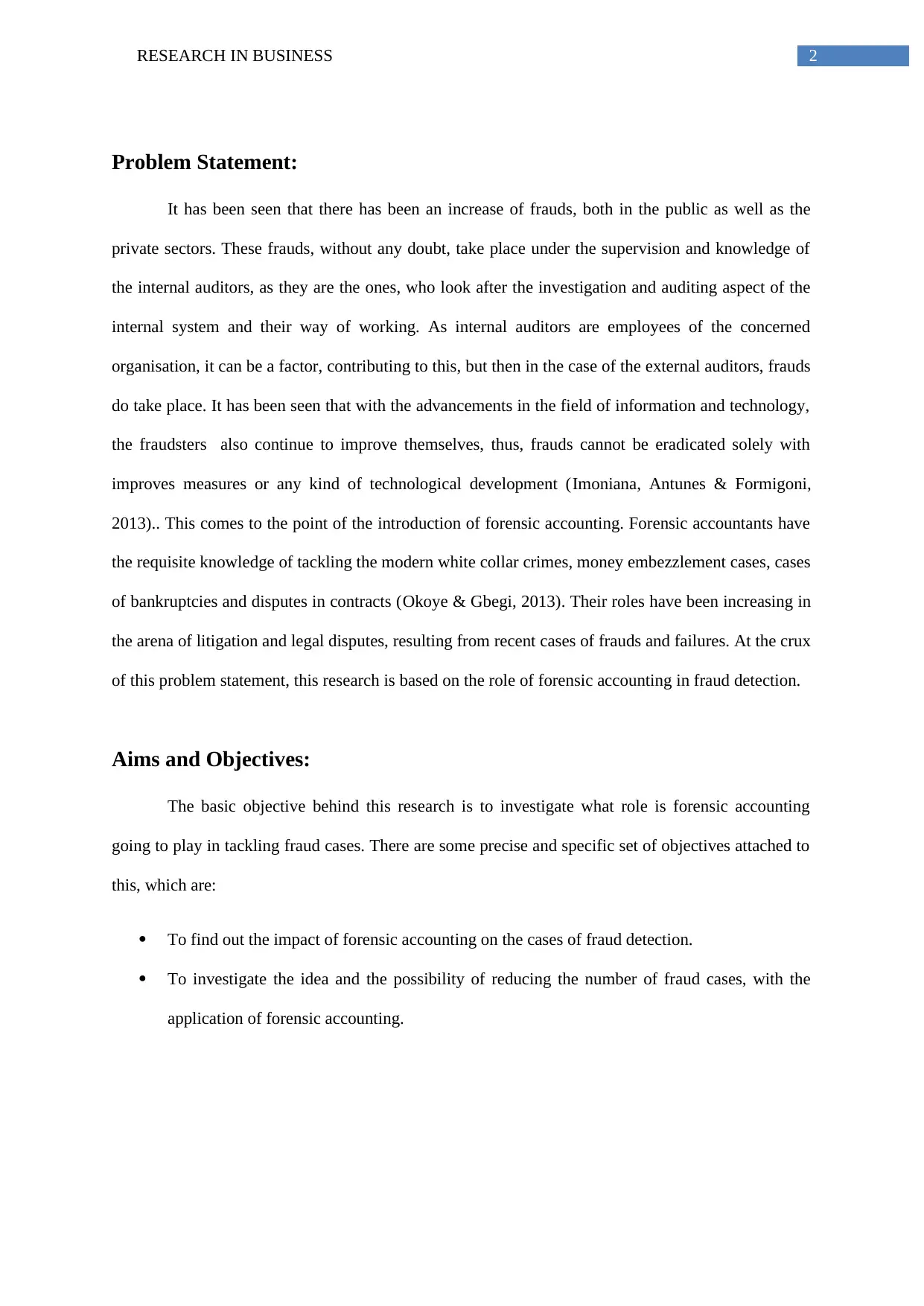
2RESEARCH IN BUSINESS
Problem Statement:
It has been seen that there has been an increase of frauds, both in the public as well as the
private sectors. These frauds, without any doubt, take place under the supervision and knowledge of
the internal auditors, as they are the ones, who look after the investigation and auditing aspect of the
internal system and their way of working. As internal auditors are employees of the concerned
organisation, it can be a factor, contributing to this, but then in the case of the external auditors, frauds
do take place. It has been seen that with the advancements in the field of information and technology,
the fraudsters also continue to improve themselves, thus, frauds cannot be eradicated solely with
improves measures or any kind of technological development (Imoniana, Antunes & Formigoni,
2013).. This comes to the point of the introduction of forensic accounting. Forensic accountants have
the requisite knowledge of tackling the modern white collar crimes, money embezzlement cases, cases
of bankruptcies and disputes in contracts (Okoye & Gbegi, 2013). Their roles have been increasing in
the arena of litigation and legal disputes, resulting from recent cases of frauds and failures. At the crux
of this problem statement, this research is based on the role of forensic accounting in fraud detection.
Aims and Objectives:
The basic objective behind this research is to investigate what role is forensic accounting
going to play in tackling fraud cases. There are some precise and specific set of objectives attached to
this, which are:
To find out the impact of forensic accounting on the cases of fraud detection.
To investigate the idea and the possibility of reducing the number of fraud cases, with the
application of forensic accounting.
Problem Statement:
It has been seen that there has been an increase of frauds, both in the public as well as the
private sectors. These frauds, without any doubt, take place under the supervision and knowledge of
the internal auditors, as they are the ones, who look after the investigation and auditing aspect of the
internal system and their way of working. As internal auditors are employees of the concerned
organisation, it can be a factor, contributing to this, but then in the case of the external auditors, frauds
do take place. It has been seen that with the advancements in the field of information and technology,
the fraudsters also continue to improve themselves, thus, frauds cannot be eradicated solely with
improves measures or any kind of technological development (Imoniana, Antunes & Formigoni,
2013).. This comes to the point of the introduction of forensic accounting. Forensic accountants have
the requisite knowledge of tackling the modern white collar crimes, money embezzlement cases, cases
of bankruptcies and disputes in contracts (Okoye & Gbegi, 2013). Their roles have been increasing in
the arena of litigation and legal disputes, resulting from recent cases of frauds and failures. At the crux
of this problem statement, this research is based on the role of forensic accounting in fraud detection.
Aims and Objectives:
The basic objective behind this research is to investigate what role is forensic accounting
going to play in tackling fraud cases. There are some precise and specific set of objectives attached to
this, which are:
To find out the impact of forensic accounting on the cases of fraud detection.
To investigate the idea and the possibility of reducing the number of fraud cases, with the
application of forensic accounting.
⊘ This is a preview!⊘
Do you want full access?
Subscribe today to unlock all pages.

Trusted by 1+ million students worldwide
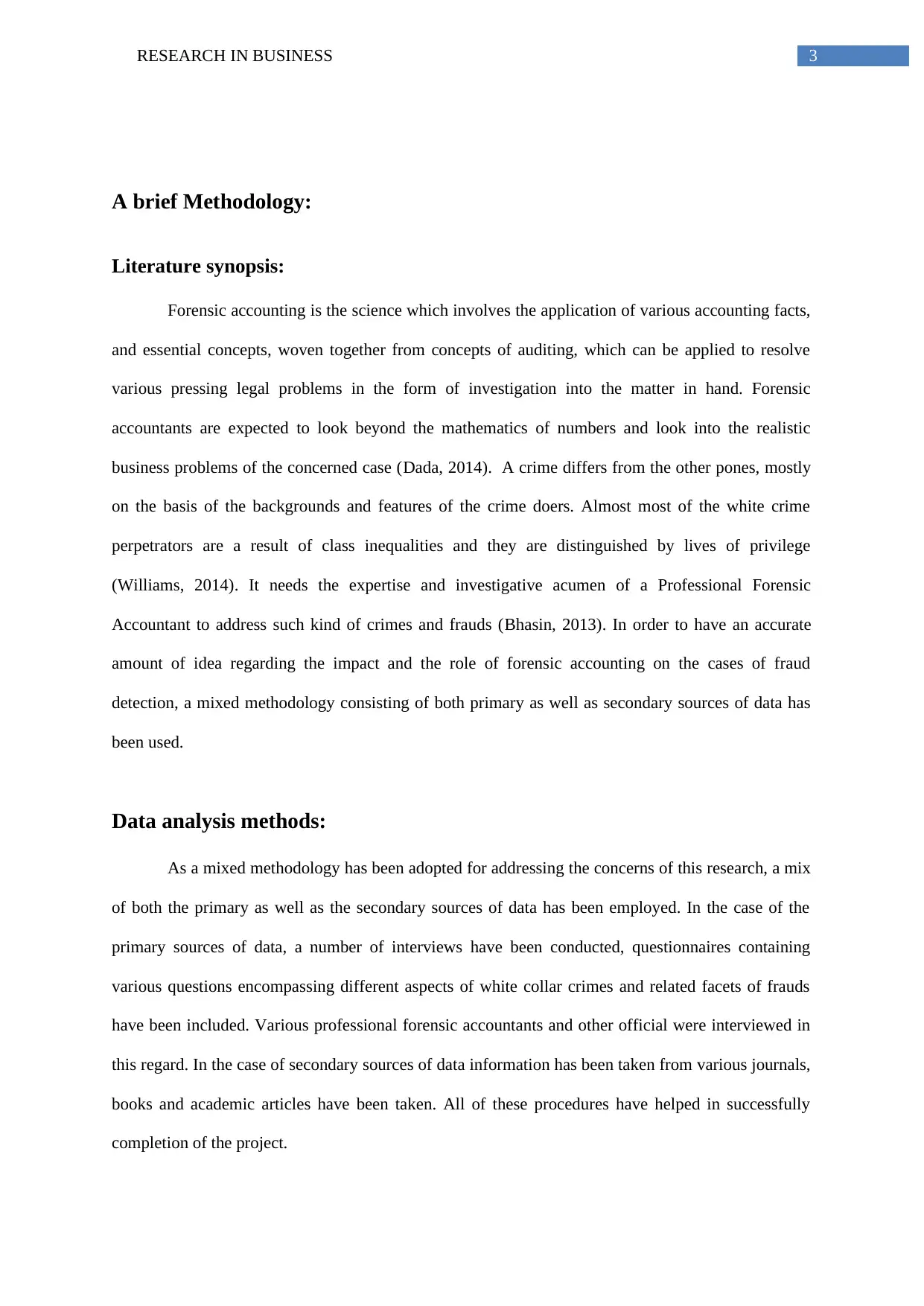
3RESEARCH IN BUSINESS
A brief Methodology:
Literature synopsis:
Forensic accounting is the science which involves the application of various accounting facts,
and essential concepts, woven together from concepts of auditing, which can be applied to resolve
various pressing legal problems in the form of investigation into the matter in hand. Forensic
accountants are expected to look beyond the mathematics of numbers and look into the realistic
business problems of the concerned case (Dada, 2014). A crime differs from the other pones, mostly
on the basis of the backgrounds and features of the crime doers. Almost most of the white crime
perpetrators are a result of class inequalities and they are distinguished by lives of privilege
(Williams, 2014). It needs the expertise and investigative acumen of a Professional Forensic
Accountant to address such kind of crimes and frauds (Bhasin, 2013). In order to have an accurate
amount of idea regarding the impact and the role of forensic accounting on the cases of fraud
detection, a mixed methodology consisting of both primary as well as secondary sources of data has
been used.
Data analysis methods:
As a mixed methodology has been adopted for addressing the concerns of this research, a mix
of both the primary as well as the secondary sources of data has been employed. In the case of the
primary sources of data, a number of interviews have been conducted, questionnaires containing
various questions encompassing different aspects of white collar crimes and related facets of frauds
have been included. Various professional forensic accountants and other official were interviewed in
this regard. In the case of secondary sources of data information has been taken from various journals,
books and academic articles have been taken. All of these procedures have helped in successfully
completion of the project.
A brief Methodology:
Literature synopsis:
Forensic accounting is the science which involves the application of various accounting facts,
and essential concepts, woven together from concepts of auditing, which can be applied to resolve
various pressing legal problems in the form of investigation into the matter in hand. Forensic
accountants are expected to look beyond the mathematics of numbers and look into the realistic
business problems of the concerned case (Dada, 2014). A crime differs from the other pones, mostly
on the basis of the backgrounds and features of the crime doers. Almost most of the white crime
perpetrators are a result of class inequalities and they are distinguished by lives of privilege
(Williams, 2014). It needs the expertise and investigative acumen of a Professional Forensic
Accountant to address such kind of crimes and frauds (Bhasin, 2013). In order to have an accurate
amount of idea regarding the impact and the role of forensic accounting on the cases of fraud
detection, a mixed methodology consisting of both primary as well as secondary sources of data has
been used.
Data analysis methods:
As a mixed methodology has been adopted for addressing the concerns of this research, a mix
of both the primary as well as the secondary sources of data has been employed. In the case of the
primary sources of data, a number of interviews have been conducted, questionnaires containing
various questions encompassing different aspects of white collar crimes and related facets of frauds
have been included. Various professional forensic accountants and other official were interviewed in
this regard. In the case of secondary sources of data information has been taken from various journals,
books and academic articles have been taken. All of these procedures have helped in successfully
completion of the project.
Paraphrase This Document
Need a fresh take? Get an instant paraphrase of this document with our AI Paraphraser

4RESEARCH IN BUSINESS
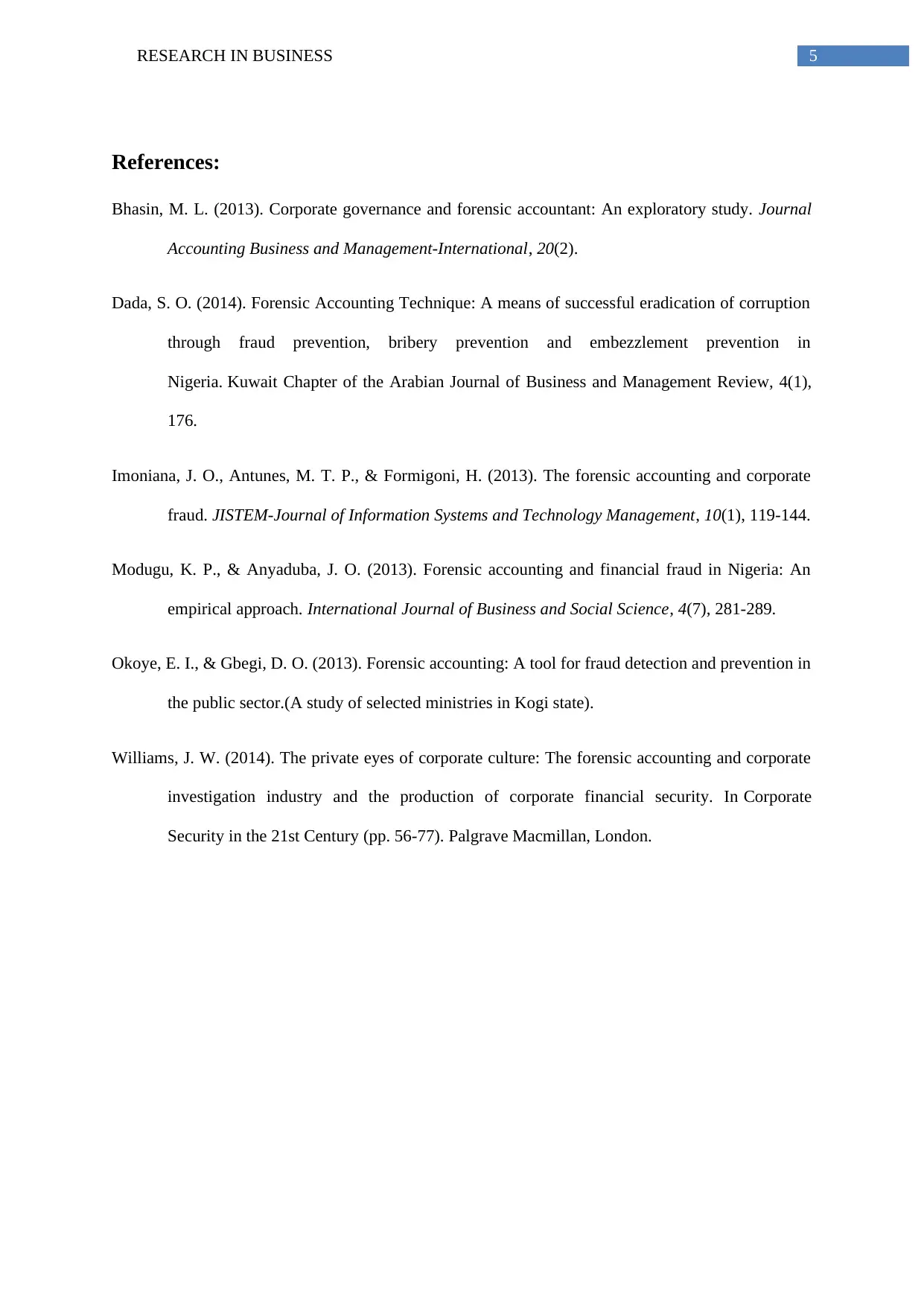
5RESEARCH IN BUSINESS
References:
Bhasin, M. L. (2013). Corporate governance and forensic accountant: An exploratory study. Journal
Accounting Business and Management-International, 20(2).
Dada, S. O. (2014). Forensic Accounting Technique: A means of successful eradication of corruption
through fraud prevention, bribery prevention and embezzlement prevention in
Nigeria. Kuwait Chapter of the Arabian Journal of Business and Management Review, 4(1),
176.
Imoniana, J. O., Antunes, M. T. P., & Formigoni, H. (2013). The forensic accounting and corporate
fraud. JISTEM-Journal of Information Systems and Technology Management, 10(1), 119-144.
Modugu, K. P., & Anyaduba, J. O. (2013). Forensic accounting and financial fraud in Nigeria: An
empirical approach. International Journal of Business and Social Science, 4(7), 281-289.
Okoye, E. I., & Gbegi, D. O. (2013). Forensic accounting: A tool for fraud detection and prevention in
the public sector.(A study of selected ministries in Kogi state).
Williams, J. W. (2014). The private eyes of corporate culture: The forensic accounting and corporate
investigation industry and the production of corporate financial security. In Corporate
Security in the 21st Century (pp. 56-77). Palgrave Macmillan, London.
References:
Bhasin, M. L. (2013). Corporate governance and forensic accountant: An exploratory study. Journal
Accounting Business and Management-International, 20(2).
Dada, S. O. (2014). Forensic Accounting Technique: A means of successful eradication of corruption
through fraud prevention, bribery prevention and embezzlement prevention in
Nigeria. Kuwait Chapter of the Arabian Journal of Business and Management Review, 4(1),
176.
Imoniana, J. O., Antunes, M. T. P., & Formigoni, H. (2013). The forensic accounting and corporate
fraud. JISTEM-Journal of Information Systems and Technology Management, 10(1), 119-144.
Modugu, K. P., & Anyaduba, J. O. (2013). Forensic accounting and financial fraud in Nigeria: An
empirical approach. International Journal of Business and Social Science, 4(7), 281-289.
Okoye, E. I., & Gbegi, D. O. (2013). Forensic accounting: A tool for fraud detection and prevention in
the public sector.(A study of selected ministries in Kogi state).
Williams, J. W. (2014). The private eyes of corporate culture: The forensic accounting and corporate
investigation industry and the production of corporate financial security. In Corporate
Security in the 21st Century (pp. 56-77). Palgrave Macmillan, London.
⊘ This is a preview!⊘
Do you want full access?
Subscribe today to unlock all pages.

Trusted by 1+ million students worldwide
1 out of 6
Related Documents
Your All-in-One AI-Powered Toolkit for Academic Success.
+13062052269
info@desklib.com
Available 24*7 on WhatsApp / Email
![[object Object]](/_next/static/media/star-bottom.7253800d.svg)
Unlock your academic potential
Copyright © 2020–2025 A2Z Services. All Rights Reserved. Developed and managed by ZUCOL.

